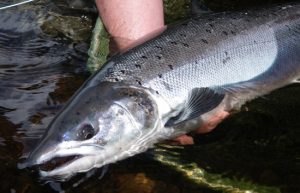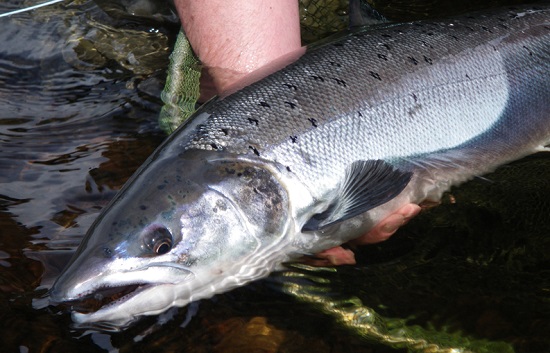The Environment Agency’s announcement of measures to regulate salmon and sea trout angling and commercial netting in England has met with a mixed response from the nearly 30,000 anglers who buy a migratory fish rod licence each year.
The new measures will be in place for 10 years, with a review in 5 years’ time, subject to the outcome of a formal four-week consultation to be announced at the end of February. Objections submitted to this consultation will be responded to individually and then the Minister will make a final decision in April or May, taking into account any objections which are not withdrawn.
Anglers are celebrating the Agency’s stated intention to close the drift net fishery off the North East coast of England with effect from 2018, which will save over 15,000 salmon and sea trout from a large number of English and Scottish rivers. Drift nets will also close in the Lune and Ribble this year, saving 300 fish returning to these rivers. These so-called ‘mixed-stock’ fisheries have been an embarrassment for many years and their existence has hindered international efforts to control the exploitation of salmon in their feeding grounds in the Arctic. With effect from 2019, the T&J beach nets are also to be closed for salmon fishing and have a much reduced sea trout catch, saving a further 8,000 salmon returning to rivers on the North East coast of Britain. Estuary nets in the South West of England will also close next year. Closure of unsustainable net fisheries was a key part of the Angling Trust’s Save Our Salmon campaign, launched two years ago.
 On most rivers in the country, the Environment Agency has accepted the Angling Trust’s argument that it should adopt a voluntary rather than mandatory approach to achieving catch and release targets. In 2016, the government announced that it intended to impose 100% mandatory catch and release on anglers throughout the country, and the Angling Trust welcomes the fact that the Environment Agency has listened to the case for self-regulation by angling clubs and fisheries. Anglers will need to ensure that these targets are met and that they submit catch returns to avoid mandatory measures being introduced in future years.
On most rivers in the country, the Environment Agency has accepted the Angling Trust’s argument that it should adopt a voluntary rather than mandatory approach to achieving catch and release targets. In 2016, the government announced that it intended to impose 100% mandatory catch and release on anglers throughout the country, and the Angling Trust welcomes the fact that the Environment Agency has listened to the case for self-regulation by angling clubs and fisheries. Anglers will need to ensure that these targets are met and that they submit catch returns to avoid mandatory measures being introduced in future years.
However, on rivers predicted to be ‘At Risk’ of failing to meet their conservation targets in 2020, the Agency has insisted that anglers must put every salmon back with effect from 2018 or face prosecution, after fisheries conservation charities called for mandatory controls on rod fisheries not only on ‘At Risk’, but also on ‘Probably At Risk’ rivers. This has led to strong objections from many anglers in the North West of England, in particular, who do not accept the accuracy of the official assessment of stocks in their rivers and would like a more flexible voluntary approach to catch and release. The Angling Trust has arranged a meeting on 26th January with representatives of rivers in the North West and the Environment Agency to discuss their concerns.
Many of the proposed new rules governing the type of tackle that can be used by anglers will instead be included in a voluntary code of good practice after the Angling Trust and many anglers resisted the imposition of new by-laws in this area
Regulation of exploitation by nets and rods was just one part of a Five Point Approach to restoring salmon stocks that was announced by the Environment Agency two years ago. The Angling Trust and Fish Legal have campaigned vigorously – and threatened legal action – to try and force the government to take urgent action on the other four points. In particular, it wants to see action to stop pollution from sewers and farms and action to tackle unsustainable predation by cormorants and goosanders.
Mark Lloyd, Chief Executive of the Angling Trust and Fish Legal said: “We are delighted to have won this important campaign to save more than 20,000 salmon from being killed in nets every year and to have protected many anglers from draconian regulations. However, we now need to see urgent action to tackle the root causes of declining stocks which are water quality, predation, poor marine survival and degraded habitats. We will also support our members calling for an independent review of the classification system to ensure that it provides the most accurate assessment possible of salmon stocks that has the confidence of rod and net fisheries alike.”










